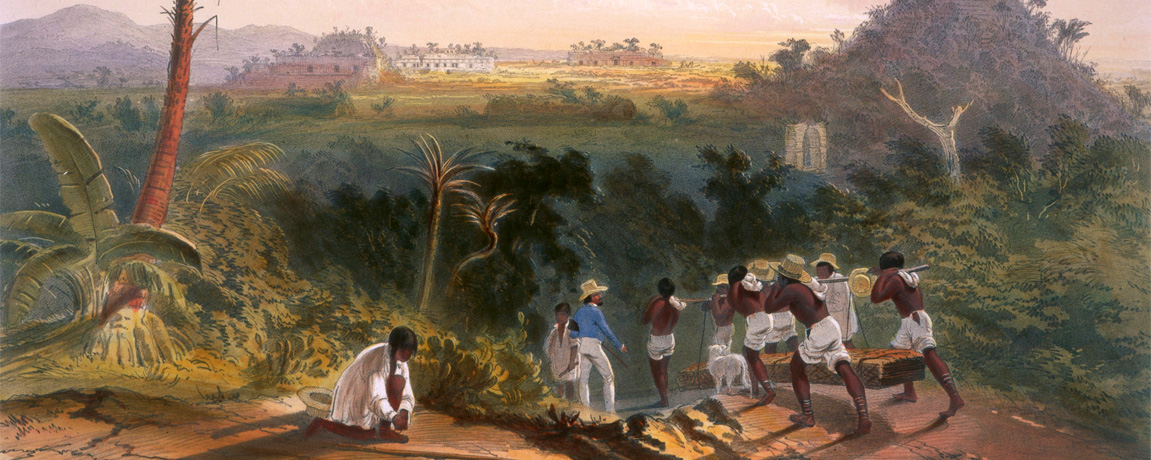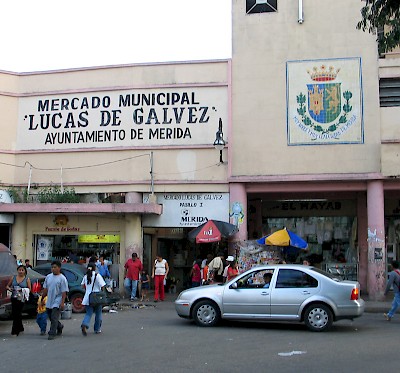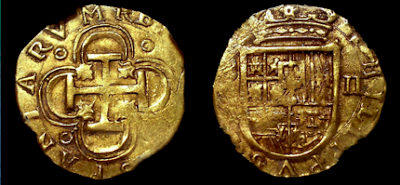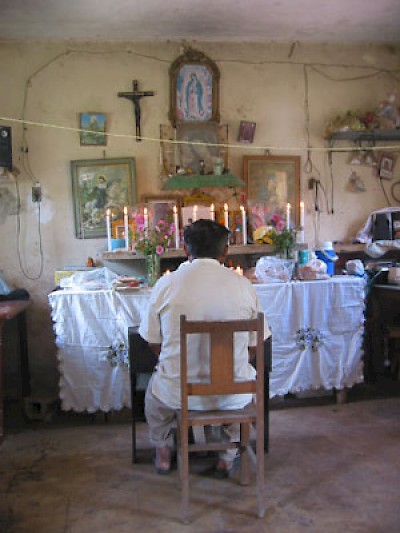Memoirs of an Ensign
Notes from Nadine Calder, the translator of what follows: Remembering the review I read in Yucatan Living of Eligio Ancona's El Filibustero, I located other works by Ancona. The opening of Memorias de un Alférez may entertain some of your readers--or not! I have no intention, not now anyway, of translating the entire novel, which is two volumes, a total of 31 chapters. The excerpt below is only the first few pages of Chapter One. (The ellipses are part of the original text, not omissions.) It was published in 1904 but set in an even earlier Mérida: the end of the 18th century.
_______________________________________________
A Second Lieutenant’s Memoirs by Eligio Ancona
Chapter One (partial)
In the fall of 1796 I was living temporarily in a modest house in the Santa Ana district, which at that time seemed to me the quietest and most secluded in Mérida. A little parlor, a bedroom, a small dining room and a spacious patio constituted the property which would have comfortably accommodated two palaces such as those found in Europe. Not a single human sound came to mingle with the soft warbling of the birds that before my eyes leaped happily from branch to branch without caring in the least about my presence. Light, silence, and tranquility . . . . were all that I craved at that time and I must admit that I was contented.
The interior of the house was in perfect harmony with the exterior. I don’t know if I should give you the name of the street that led to that narrow winding lane on whose south side appeared my sturdy cedar door and high window protected by an iron grille.
There was no fear that the neighbors would bother me, because there were none. Off in the distance, in one of the alley’s extensions, could be seen a grouping of two or three palm huts which housed a family who, belonging to the town’s most humble class, didn’t dare to approach me.
Rustic walls of loose rock, partly obscured by the leaves and flowers of a wild creeper, lined the rest of the way as far as the eye could see from the lookout located in my window. Behind these walls, which rose barely five or six feet above the ground, unfolded vegetation so exuberant that it seemed indebted not so much to art as to the tropical region’s rich and provident nature. Beautiful trees of dense, dark foliage, whose name I didn’t know, wove their branches with those of the orange tree, loaded with precious blossoms, and with some coconut palms whose fruit was not yet fully developed.
The road’s surface, with the exception of a narrow path where men’s footprints appeared from time to time, was covered with short grass whose stems periodically produced a few flowers of a yellow color like that of so many other golden studs with which nature dotted that carpet. Butterflies of many colors occupied the space, and they could be seen to flee in swarms only when the children of the neighboring shack ran after them, armed with branches stripped of their leaves. These children usually showed up completely naked, protected by the blessed modesty of innocence and confusedly mingled among dogs, cats, and other domestic animals with whom they happily romped as if with so many other members of their family. Occasionally a flock of sheep also crossed the path, driven by an indian shepherd who wore nothing more than a cotton sash around his waist and who used to stop in front of my window to milk a goat and offer me a stingy quantity in a language I could barely understand.
All these scenes and the rustic landscape in which they were set maintained for me the illusion that I was living in the country, and I repeat that they enchanted me, perhaps because of the contrast they provided with my previous life. I had spent the best years of my adolescence stuck in a bakery in the center of Madrid and sleeping at night in a narrow attic on Calle de Alcalá. I was forever grateful to my uncle who one day had the inspiration to pay a visit to the powerful Don Manuel Godoy to let him know that a nephew of his, living at his expense and a considerable burden, had a burning desire to travel to America. I was grateful, as well, to that important figure who, knowing I don’t know how, that there was a company of cavalrymen in the City of Mérida, capital of the remote province of Yucatán, had issued an order that I be assigned the office of second lieutenant in that company. Finally, I was grateful to the governor and capitán general of the province, Don Arturo O’Nell y O’Kelli, for the speed with which he put me in possession of my destiny, thanks to a certain letter of recommendation that I presented to him upon my arrival.
But in the depths of my heart the person for whom I held the highest regard and gratitude was the gallant Flavio, my old friend from Madrid who had come to Mérida the year before I did. I will never lose from memory the moment he threw himself into my arms to bid me welcome in that extensive patio of the barracks where the company’s chief officer had just introduced me to his subordinates. It is so heartwarming to meet up with a friend in a faraway country you’re visiting for the first time, and in which you are surrounded by foreign strangers who regard you with indifference! . . . . . . .
It was to Flavio that I was indebted for the cheerful little house I have just described. Seeing the ramshackle barracks in which I was destined to serve and in which he served as well, when I asked with some misgiving if that was his permanent residence, my friend reassured me with a smile, and taking me familiarly by the arm, he brought me here. As we walked through a labyrinth of streets and alleyways which I can barely recall now, Flavio began giving me some early notions about the country to which I had brought my destiny.
"The Yucatán province," he told me, "is at least until now one of the poorest in America. Its earth is arid and sterile, and it doesn’t harbor within its bowels any of those precious metals that have at the same time enriched many Spaniards and impoverished the mother country. So, if you’ve come to the new world in hopes of becoming a millionaire as I did, and as do all our countrymen in general, you’re in for a serious letdown; you might as well pack your bags again for Mexico or Peru. But if you’re a man of courage and you prefer a tranquil life to the anxiety and agitation that riches bring with them, I advise you to stay because this is a temperate town, simple and good, that if it has any defect, it is the excessive kindness with which it welcomes all strangers, above all us European Spaniards who come here in some service of the court. Here you will never hear talk of those big crimes that are so frequent in Europe and in the big cities of America."
"Permit me to interrupt you," I said to him, "to remind you of a fact that belies your optimism. Ever since I set foot on Campeche’s beaches, I haven’t heard talk of anything but a treacherous assassination committed a little while ago on the person of Capitán General D. Lúcas de Gálvez and whose perpetrators justice has been unable to find despite having filled the jails with suspects."
"Good point!," Flavio replied with a logic I found irresistible. "That very assassination committed on the night of June 22, 1792, totally confirms what I’m telling you. Despite four years having gone by since then, the whole world is still occupied with talking about it. That alone proves that such a crime is infrequent in this country and that from that date until the present not a single other has occurred to attract the public’s attention. Furthermore, those robberies, brawls, nocturnal assaults and other excesses whose miseries frequently hang over the residents of big cities rarely come here to disturb the peace of righteous people. Perhaps that lies in the fact that even if there is poverty in the province, true misery doesn’t exist here. Nor does that great inequality of fortune and social class that beats us down in Europe and that in my opinion is a seedbed of crime.Look closely at what it’s like around here. As you walk through town, if you find not one facade of a palace, nor millionaire’s coach pulled by superb horses, nor the proud retinue of a prince who insults public misery with his luxury, neither will your eyes encounter the repugnant rags of a beggar, nor will mysterious women or muffled men detain you to relate imaginary misfortunes with the intention of exploiting you. Do you see these tidy and clean people, perhaps like no other in the world, who greet us courteously without knowing us? Well, that greeting comes not from the adulation of hypocrisy, but from their good hearts. And if you should come upon a throng of local men and women gathered for some solemn occasion, don’t avoid them, as in Europe: you can mingle among their crowds with impunity, without fear that any nastiness will assail you, nor that they will lift the watch or handkerchief from your pocket. If one day you are chosen to transport valuables for safekeeping to the S. Felipe de Bacalar presidio, don’t be afraid to set out on the long journey that separates it from Mérida, even if you travel alone and are carrying a thousand pesos in your saddlebags; because the indians and muleteers whom you meet in the wilderness, instead of thinking of robbing you, will show you the way if you’ve gone astray; they’ll give you something to eat if you’re hungry or something to drink if you’re thirsty."
From then on I didn’t concern myself with whether or not there was some optimism in what I was hearing from my companion. But I can say without a doubt that I was extremely pleased, because I am repulsed by men who speak ill of the country that kindly embraces them, and even though I had just arrived in Mérida, I already had ample proof that it welcomed gachupines like us with utmost deference.
Flavio gave me many other tips about the customs and habits of the province on that day. I limit myself to noting those already cited because the confidence they inspired in me would very soon have disastrous consequences for me.
When we arrived at the house, my guide took a key from his pocket, opened the door, showed me around and said:
"As you can see, the retreat I’ve chosen to spend the hours I’m free from service couldn’t be more modest or humble, and you too can spend your free time here if you don’t think it’s too small for two people."
"I accept your offer," I told him, "although it will of course be necessary to provide some furniture because except for the bed I’ve seen in the bedroom, this comfortable leather armchair I’m seated in, and that enormous trunk serving as a chair for you, I don’t see a single thing that indicates a man lives here."
"Do you think that a cavalry lieutenant could with his meager salary buy consoles, mirrors, and armoires?""I don’t mean that much; but a few chairs and a table or desk are objects one can’t do without. If our salary is meager, I still have in my pocket several doubloons my uncle gave me when I left Madrid."
"Now you’re talking money, or better to say, “gold.” And so that your gold isn’t all spent buying furniture, it occurs to me that there’s a way to economize. Let’s buy the pieces at a public auction. Otherwise, it would be useless or at least too late to try to buy them any other way because there are neither furniture stores here nor some artisan who could make them for you in the time you would like.
I accepted his idea, and the day on which I began this story, Flavio showed up at the casita at ten in the morning and slapping me on the shoulder, he said:
"We now have what we need."
"What? . . . . . A raise in pay? . . . . . A promotion to captain? . . . . ."
"Come now! . . . . . none of that, unfortunately, much as you might wish. A few moments ago as I passed by the fancy houses, I saw on a board hanging on the wall a sheet of paper with an official seal announcing to the public that today they must put up for auction the seized furnishings of Pedro de Balbastro in order to pay off his creditors.
"As long as those furnishings aren’t too expensive for my means . . . . ."
"It’s possible that they’ll cost you much less than what they’re worth because the seizure is arousing fear in all Mérida’s inhabitants . . . . ."
"Except in me, for the simple reason that I don’t know who he is."
"During the time in which D. Lúcas de Gálvez governed the province, Pedro de Balbastro worked in the casa de gobierno as interpreter of the Mayan language. But it’s generally believed that his lordship also employed him for his amorous adventures because the deceased governor, apart from his excellent qualities, had a weakness, an excessive affinity for the fair sex. Be that as it may, the truth is that Balbastro enjoyed his confidence, and this distinction widely attracted a great deal of attention as the interpreter belongs to one of the classes known as mixed. Do you know what these classes are?"
"No."
"Despite the fact that in the province there is not, strictly speaking, what in Europe is called nobility, that doesn’t impede there being distinctions and inequalities among its inhabitants. Those who maintain purely Spanish blood in their veins are called Spaniards, as they have come from the mother country or they have been born here to Spanish parents. The pure descendants of the race conquered by Montejo are called indians; and finally, those who have taken their origin from a mixture of both races, or from either of these with yet another, are called mixed classes or, simply, classes. Well, then, Balbastro is something like mestizo or mulato because whatever he is, it’s easy to see in the color of his face that the quantity of Spanish blood circulating in his veins is mixed with American, Asian, or African blood.""Now I’m dying to meet that creature from the four parts of the world."
"Perhaps you would be wise never to enter into relations with him for the same reason that everyone has for avoiding him."
"Hell! Has he contracted leprosy? Then it won’t be me who buys . . . . .""No! But the death of his former protector caused him such deep melancholy that after having passed several months in complete isolation, in which he came to fear that he would lose his mind, he ended up arriving at the recourse of vulgar souls: he decided to drown the pain that was consuming him in drunkenness. Since then, he’s seen only now and then in some tavern, lamenting the fact that although he himself had, on the night of the assassination, apprehended several of the villains involved in it, the punishment that they deserve has still not been administered to them. And although it is generally believed that justice still has not dealt with the real culprits, as is proven by the fact that not one of the prisoners has been sentenced, Balbastro maintains the opposite; and as he says it with an air of deep conviction, and when the alcohol fumes have gone to his head, no one contradicts him and everyone tolerates him, be it due to the compassion that his disgrace inspires, or to the fear aroused by his bullying tactics. The only ones who haven’t tolerated him are his creditors, perhaps because the debtor having lost his employment as an interpreter, they haven’t found any way to get paid other than seizing his furnishings. But unless they’ve been valued at a ridiculously low price . . . . ."
"Whether the price is high or low, I interrupted, picking up my hat, I desperately want to own something that has belonged to that man. Let’s hurry!
Flavio had vividly piqued my curiosity, and I must say that I was secretly happy to see parked in front of the door the carriage my friend had arrived in. It was one of those two-seated vehicles, covered with some kind of white fabric, to which is given the name in this country of calesa and, while it isn’t distinguished by an elegance of form or the speed of its progress, it is admirably adapted to the hot climate of the region.
****
Well, Dear Reader, what do you think? Should we entice Nadine Calder to continue her translation of this novel? Or is that enough of a peek into 18th Century Merida? Let us know by adding your comments below!






















Comments
kantil 10 years ago
Mas por favor.
Reply
Suzanne Murphy-Larronde 10 years ago
What a treat and what a fluid and readable translation. I loved it and would love to read more.
Reply
(0 to 2 comments)